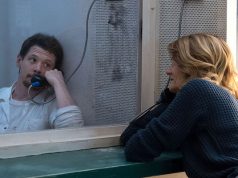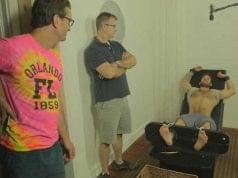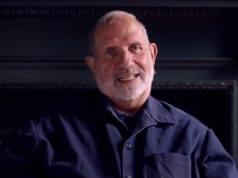It’s hard to go wrong with a title like “Mr. Death,” and director Errol Morris uses the sort of music you’d hear in a Hollywood summer blockbuster, accompanied by opening credits that hide the fact you’re watching a documentary, to draw you immediately into this story of a man who designed execution equipment for a living.
Fred A. Leuchter Jr. was a Massachusetts engineer who was concerned about the inhumane conditions of many states’ electric chairs. Often, due to out-dated practices and prisons’ unfamiliarity with some laws of science, executing a criminal amounted to torture, Leuchter said.
So he went to work on Tennessee’s electric chair, bringing it to his Boston home to work on it intensely. His success with that project brought New Jersey calling to have him help out with their lethal injections. “What lethal injection has to do with electrocution is beyond me,” Leuchter says. But the trend continued: Since he had fixed problems with one form of capital punishment, states figured he could help them with theirs. (“Delaware had a hanging problem that they totally were not able to deal with,” he says frankly.)
The first one-third of the film tells, in riveting fashion, how Leuchter traveled around the country, helping prisons execute their inmates with more efficiency and humanity. We also learn details like Leuchter’s tendency to drink 40 cups of coffee a day and smoke six packs of cigarettes (perhaps subconsciously designing his own personal method of execution), and how his wife, Caroline — heard but never seen on camera, having since split up with Fred — found his work a little unsettling.
But don’t forget, the film is called “The Rise AND FALL of Fred A. Leuchter, Jr.” The “fall” comes when he is called upon as an expert witness in the trial of history revisionist Ernst Zundel, who distributed inflammatory literature claiming the Holocaust never happened. Specifically, he said, Auschwitz was not used as a gas chamber. In 1988, Leuchter headed to Poland, accompanied by Caroline (he called it their honeymoon; she tries never to think about the experience), a translator and a cinematographer. His mission: to analyze Auschwitz to see if it could have been used as a gas chamber.
If anyone knows how gas chambers work, it’s Leuchter. He chips off parts of the walls to have a lab check for traces of cyanide. He also examines the layout of the room: Did it have all the necessary accoutrements of a gas chamber? His finding, surprisingly, is that Auschwitz was NOT used as a gas chamber. Zundel is still found guilty in court, but Leuchter has sealed his own fate: He’s now a history revisionist, unwisely extrapolating his findings regarding one concentration camp to mean the entire Holocaust never happened.
It’s a positively fascinating story, told with slickness (and honesty) by the people involved. I’ve seen plenty of “regular” movies that were slower-paced and less enjoyable than this thought-provoking, eminently watchable little footnote from a history book.
A (; )





